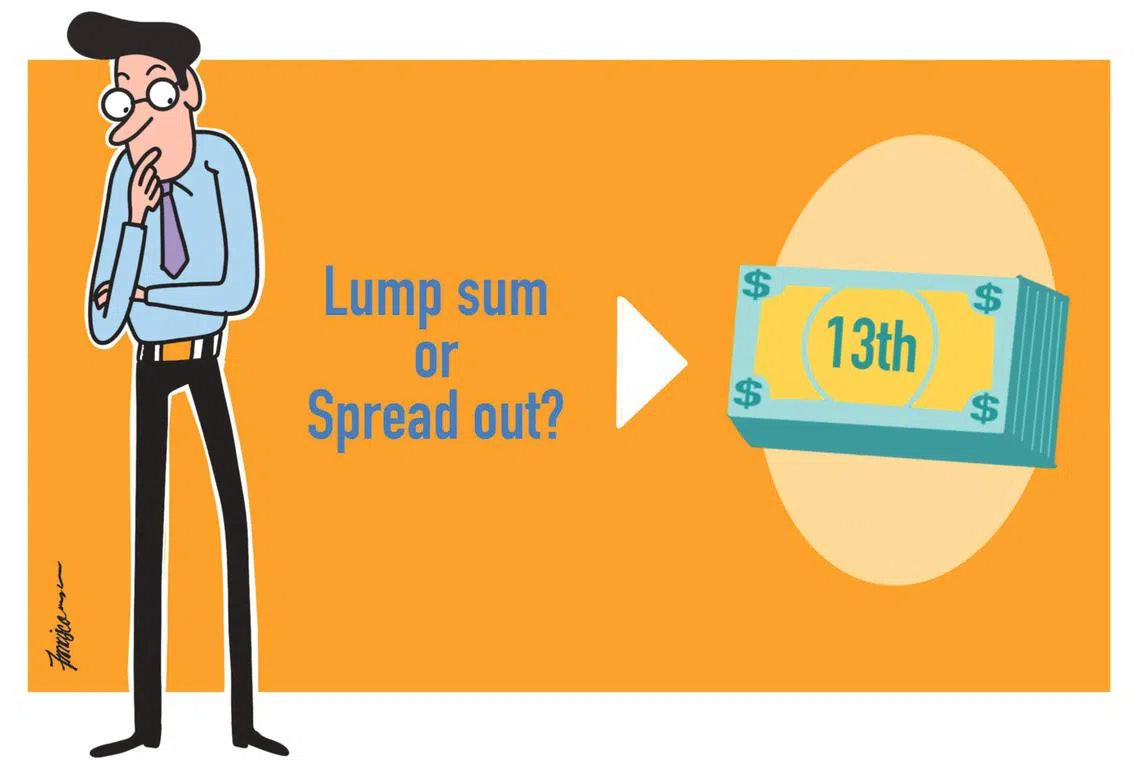askST Jobs: What is the 13th-month bonus and are you entitled to one?
Sign up now: Get tips on how to grow your career and money

Employees may not necessarily lose out even if they do not get an annual wage supplement.
ST ILLUSTRATION: MANNY FRANCISCO
In this series, manpower reporter Tay Hong Yi offers practical answers to candid questions on navigating workplace challenges and getting ahead in your career. Get more tips by signing up to The Straits Times’ Headstart newsletter
Q: What is the 13th-month bonus? Am I losing out if I don’t have a 13th-month component in my salary package?
A: The annual wage supplement (AWS), also known as the 13th-month bonus, is a single annual payment on top of an employee’s total annual wage, says Mr Rahul Chawla, partner and head of talent solutions for South-east Asia at professional services firm Aon.
The payment is typically paid out at the end of the year, around December, and usually amounts to up to one month’s worth of gross monthly salary, pro-rated for those who have been with the company for under a year.
This payout is separate from performance bonuses, which depend on the company’s financial performance and individual employee performance, says Mr Chawla.
“The AWS is provided to give employees additional financial support, especially during the year-end holiday season, and recognise their dedication and contributions to the company over the year.”
Mr Chawla notes that the AWS is not compulsory, though employers are encouraged to give the payment to their employees as a reward for contributing to the company’s performance.
“This has been a longstanding feature in both the public and private sectors to boost employee morale and motivation, supporting talent attraction and retention.”
While data on the proportion of firms that pay the AWS is not publicly available, the latest Ministry of Manpower survey data shows that close to 70 per cent of firms have an annual variable component in their pay packages. The annual variable component includes the AWS and other variable bonuses.
As for why not all employers adopt the 13th-month bonus, Mr Chawla says some companies may eschew this practice to either simplify their compensation structures or, in the case of multinationals, keep the structure consistent with that in other markets where such payouts are not prevalent.
Employees may not necessarily lose out even if they do not get an AWS.
Ms Andrea Tan, head of consultancy Mercer Singapore’s rewards practice, says that the overall compensation of employees includes not just base salary but also bonuses, benefits and other forms of remuneration.
“Some employers may offer higher base salaries or more substantial bonuses in lieu of a 13th-month payment, which can result in a more favourable total compensation package.”
Employers that do not offer a 13th-month payout may also offer performance-based bonuses or profit-sharing arrangements. “These can sometimes result in higher earnings for employees, especially if the company performs well,” said Ms Tan.
The provision of additional benefits, such as health insurance, retirement contributions, flexible working arrangements or professional development opportunities, may help offset the lack of an AWS payout as well.
“These benefits can enhance an employee’s overall job satisfaction and financial well-being,” said Ms Tan.
To determine if there is pay equity, Mercer advises employees to do a comprehensive evaluation of their total compensation package, considering base salary, bonuses, benefits, job security and career development opportunities.
“By comparing these factors against industry standards and personal financial needs, employees can make informed decisions about their compensation and whether they feel adequately compensated without a 13th-month salary,” Ms Tan said.



